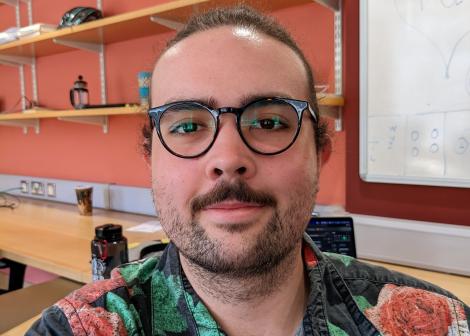Name: Calum Guinea
Hometown: West Drayton, Middlesex, United Kingdom
Extracurricular interests: Learning to play the keyboard, music production, reading
Postgraduate degree: PhD in Psychology
Life before Catz
“I first studied psychology at an undergraduate level at Royal Holloway, University of London. It was during this time that I gained a sense of the ultimate challenge that is understanding the workings of the human brain – it is one of, if not the most complicated things we know to exist and we are still in the process of understanding that complexity and how it generates human behaviour.
“After my undergraduate degree, I took time out from my studies to mentor students at both Royal Holloway and Brunel University, helping them to manage the effects of neurodiversity or mental health diagnoses on their academic work. I then embarked on a Master of Research degree in Cognitive Neuroscience at University College London, in which I used a mathematical model of happiness to understand how people’s mood fluctuates. Shortly after finishing this degree, I worked at the University of Oxford’s Psychiatry department on a project aiming to understand the psychiatric benefits of ketamine.”
Life at Catz
“I chose Catz as my first choice of the Cambridge Colleges when applying for my PhD. I was under the impression that there was a large and active postgraduate community and fortunately this turned out to be true: the MCR Committee is proactive in organising events that bring postgrads together and they pick some pretty creative themes for our formal dinners! I knew only one person at Cambridge before I arrived at Catz and the College community gave me a warm welcome.
“As the first generation in my family to pursue an undergraduate degree, I am passionate about outreach activities that engage groups who are traditionally underrepresented at both undergraduate and postgraduate levels. This summer I will be involved in the Department of Psychiatry’s Summer Cambridge Access to Mental Health & Psychology (Summer CAMP) programme to help students learn the skills required to write a research proposal for the postgraduate application process, which isn’t usually covered by most undergraduate courses and represents a massive skills gap. As part of Insight Outreach’s Oxbridge Mentoring Scheme, I’m also working with some college students who are starting their university application process. The Insight Outreach scheme involves working with these students over 10 months, developing the skills that Oxbridge are looking for in applications and helping them write their personal statements. I will also be helping on another scheme in the summer, called Zero Gravity, which likewise aims to support students from underrepresented backgrounds with their Oxbridge applications.”
Postgraduate studies
“My PhD focuses on how the habenula, a tiny and highly evolutionarily conserved brain structure, contributes to our learning and motivation for reward and punishment, particularly as it relates to specific symptoms of anxiety and depression. The aim of my PhD will be to disentangle the behavioural effects of anxiety and depression on learning and motivation, characterise their interaction during decision making and probe how the habenula contributes to these processes using 7T fMRI. A mechanistic understanding of how anxiety and depression symptoms affect learning and motivation will help inform treatment development, particularly for instances of comorbidity and describing the habenula’s role in these processes will help build a neural model of these symptoms.
“The challenge of unlocking some of its mysteries is an exciting one. My interest in mental health comes from experience working with patients and the relative stagnation in treatment development for psychiatric conditions. In order to improve outcomes for people with a mental health diagnosis we need to develop a mechanistic understanding of symptoms and think beyond traditional diagnostic categories. My research aims to contribute to this understanding by providing a mechanistic description of cardinal anxiety and depression symptoms.”
The Harding Distinguished Postgraduate Scholars Programme
“I have really appreciated the financial freedom and comfort provided by the Harding Distinguished Postgraduate Scholars Programme, especially given the rising cost of living in the UK. Student finance can be a massive source of stress and I needed to work during previous undergraduate and postgraduate courses, so it is nice to worry less about my financial circumstances now I’m studying for a PhD. The additional research funding allocated to each Scholar has enabled me to buy a laptop and textbooks, and become a member of the British Association of Psychopharmacology.”
Advice for undergraduates thinking of applying for postgraduate studies
“My advice would be to not take that decision lightly: a PhD is a significant undertaking that you should be confident is the right step for you. One thing I wish I had known before starting my postgraduate applications is that luck plays an important role in whether you get the place or the funding you wanted. There will be lots of strong applicants, including you and sometimes things outside your control will determine the outcome. What you can do is try a differentiate yourself from other applicants as much as possible – small differences can count for a lot.”





